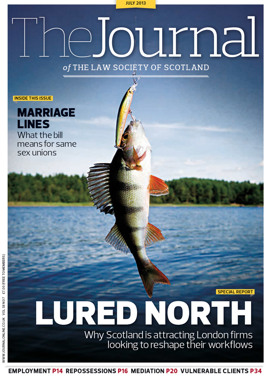Law reform roundup

Criminal Justice (Scotland) Bill
This bill was introduced to the Scottish Parliament on 21 June 2013. The Society reiterated its concerns regarding the proposal to remove the requirement for corroboration, as there are fears this could increase the risk of miscarriages of justice. The Society will continue to closely monitor the progress of this bill in the coming months.
Victims and Witnesses (Scotland) Bill
The Society provided briefing to MSPs ahead of the stage 1 debate, recommending that the bill includes a clear and unambiguous definition of “victim” so that individuals are clear what rights they have under the bill. The Society also welcomed the creation of a restitution fund, which will contribute to the costs of running support services for police officers assaulted during the course of their duties, but questioned why this fund could not be extended to cover other emergency service employees assaulted at work.
Post-legislative scrutiny
Michael Clancy, director of law reform at the Society, provided oral evidence to the Scottish Parliament’s Standards, Procedures and Public Appointments Committee on 20 June as part of its inquiry into post-legislative scrutiny. Among a number of recommendations, he suggested that the stage 3 parliamentary process could be amended to allow a greater period of time for legislative scrutiny.
Intellectual Property Bill
The Society submitted an amendment to peers, which was subsequently debated, which would ensure that Scotland, England & Wales, and Northern Ireland are each granted local divisional court jurisdiction under the new Unitary Patent Court system.
Marriage (Same Sex Couples) Bill
The Society submitted an amendment to peers, which was subsequently debated, providing that the Court of Session, rather than the Secretary of State, would have the power to determine whether an English same sex couple marriage is a civil partnership under Scots law.
Cross-border healthcare
The Health & Medical Law Committee responded to the Scottish Government consultation on the implementation of the EU Directive on the Application of Patients’ Rights in Cross-border Healthcare. The committee raised a number of issues, particularly on rules concerning follow-up treatment if the patient has received treatment elsewhere in Europe without authorisation from the NHS.
Full details of the above, and further information on the current work of the Law Reform Department, can be found at www.lawscot.org.uk/forthepublic/law-reform-consultations-and-bills The team can be contacted via juliabrown@lawscot.org.uk, or follow us on Twitter: @lawscot
In this issue
- Credit hire: back to basics
- You know who I mean
- Behind all the fun
- Your Future in Law
- Reading for pleasure
- Opinion column: Cameron Fyfe
- Book reviews
- Profile
- President's column
- Mapping out the Crofting Register
- Back office bait
- Another bite at the cherry
- Security of your home
- Marriage redefined
- Building better business cultures
- Keeping a rein on child cases
- Minimum gain
- Beware LLP tax changes
- Framework remodelled
- Scottish Solicitors' Discipline Tribunal
- A Scottish ILG chair in New York
- Beneath the surface
- Being alert to the needs of the vulnerable
- Sins of our leaders
- How not to win business: a guide for professionals
- Litigation: a tight ship?
- Ask Ash
- Why sep rep?
- From the Brussels office
- Law reform roundup
- Diary of an innocent in-houser






